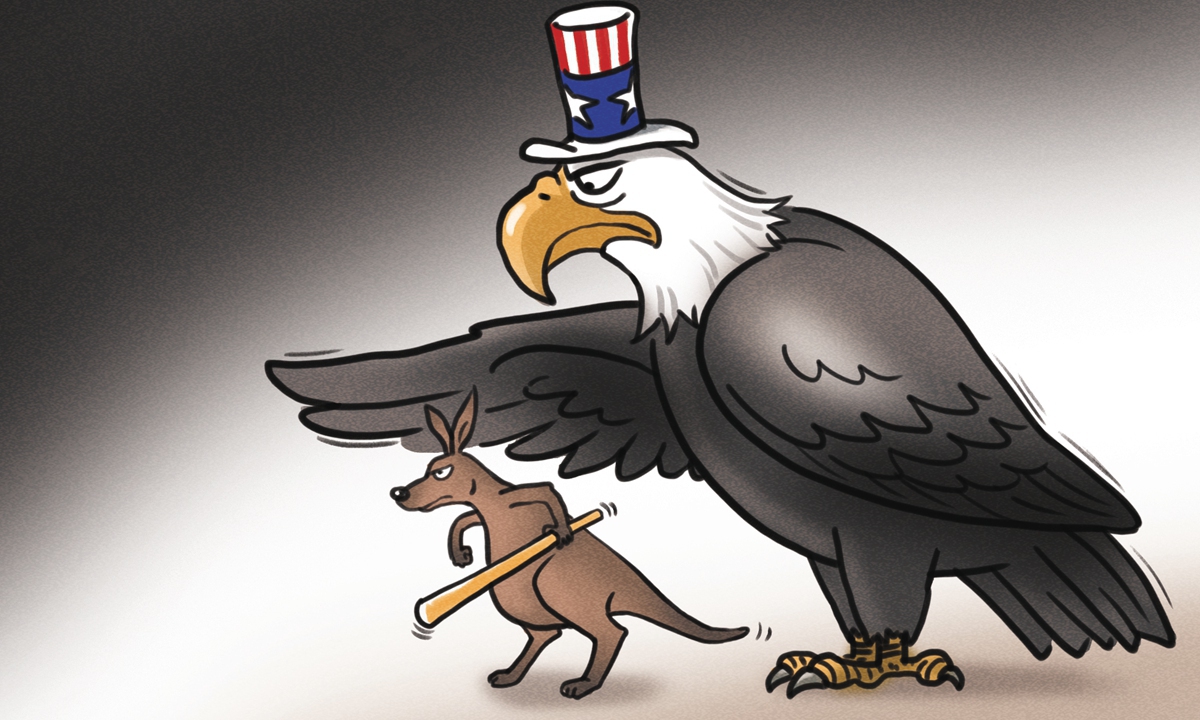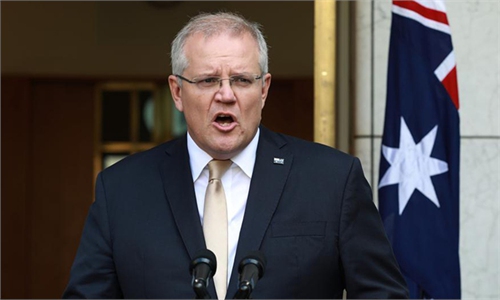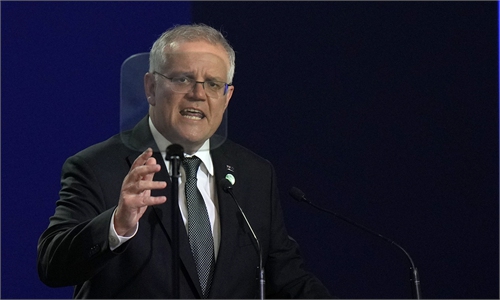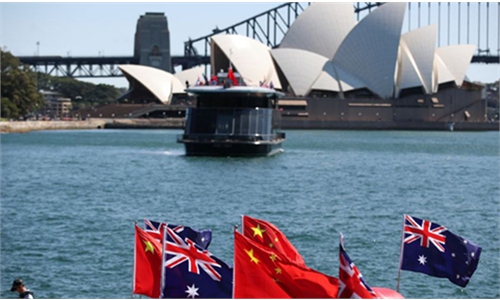Ties with US, not China, the cause of Australia’s headache

Australia US Illustration: Liu Rui/GT
On May 21, Australians will go to the polls for a general election to decide who will lead the country. Incumbent PM Scott Morrison has spared no efforts in hyping up the so-called China threat theory in an attempt to prove that only his party can safeguard Australia's security. Thus, the question - what Australia's future China policy will look like - has been placed under scrutiny by the rest of the world. Bloomberg made a simple and blatant argument - China is "one of the headaches facing Australia's next PM."However, Bloomberg missed the point. The headaches occur only because Australia has been following the US too closely in containing China. After the Australian election, if the hostility toward China continues, the headaches will continue. Yet if Australian politicians can return to rationality and maturity, stumbling blocks in China-Australia ties will be greatly reduced.
There was a time when Australia didn't have a "headache" vis-a-vis its ties with China. In quite a long period after the two countries established diplomatic relations in 1972, China has been one of the largest trading partners of Australia. Australia's economy soared because it sold iron ore, wine, dairy and beef to China, and because an increasing number of Chinese people invest and study in down under.
But Australia's headaches started after the US carried out a strategic rebalance to Asia, followed by the Indo-Pacific Strategy. Since around 2016, Australia, with no solid evidence, started to push hard the "China threat theory." Ties between the two countries have taken a nosedive.
The so-called China's threat to Australia is not real, but the fear of it has spread fast on the latter's soil thanks to the Australian media industry which is under the tight control of the US. American forces have kept feeding the Australians the so-called resources or proof that China is infiltrating Australia's internal affairs. Washington also has the power to manipulate Australian politics. Those who dare not please the US will be driven out of the office.
As a result, Canberra has been dancing to Washington's pipe all these years. Ranging from the Five Eyes and QUAD to AUKUS, Australia is now at the center of the US' Indo-Pacific Strategy.
Australia has been quite high-profile in its anti-China words and deeds. All it says sounds that the rise of China is only a threat and a challenge, without understanding that China's emergence is a long-term historical trend, or the fact that China can be a mutually beneficial partner.
Apart from viewing China as an imaginary enemy, Australia also has its own fish to fry - becoming a hegemon in the Pacific region, and it thinks only the US can help it realize the goal. Canberra believes tying itself to Washington's chariot is in Australia's national interests.
Not exactly. It will be difficult for the Australian economy to completely cast off its dependence on the Chinese market. Australia is now seeking to diversify its exports markets and its roles in the industrial chain and supply chain. For example, Australia and India on April 2 signed a comprehensive interim free trade agreement. It has also been promoting economic and trade ties with Southeast Asian countries.
Nevertheless, there is a huge gap between China and those countries in terms of trade and market. For Australia, no country can be an alternative to China. Not India, Southeast Asia, Japan, or not even the US.
Australia lacks a strong pursuit of independence and autonomy in its strategy. Over time, the gradual loss of autonomy will only do more harm to the country. For instance, it wishes to obtain rewards from Western countries through its anti-China policy, including more strategic space, key cutting-edge technologies, more access to markets, intelligence sharing, and advanced military weapons. But what the West can offer is limited. At least when it comes to economy, trade, industrial and supply chain, China can provide much more.
The upcoming election will be a battle between Morrison and Labor leader Anthony Albanese. It was the Labor Party-led government which established diplomatic ties with China 50 years ago. In 1972, then prime minister Gough Whitlam said, "The serious distortion in our foreign policy has now been corrected."
Ironically, the country came to the distortion again. Worse, given the current global political environment, it will not be as easy as 50 years ago to correct it. Any Australian politician who would raise the tone of fixing China ties now may likely be pinned the label of "surrendering" or "kowtowing" to China.
The US is the biggest influence behind China-Australia relations and it is the root cause of Australia's headaches.
But is China really an enemy? Does leeching on to the US bring more benefits? Perhaps Australia still needs a long time to think it through.
The article was compiled by Global Times reporter Li Aixin based on an interview with Xu Shanpin, an adjunct research fellow at the Center for Australian Studies, China University of Mining and Technology. opinion@globaltimes.com.cn



